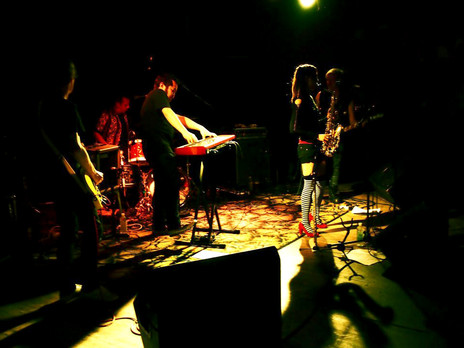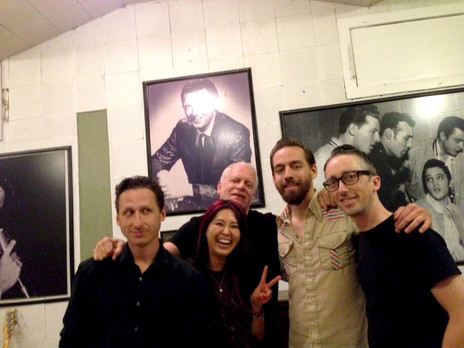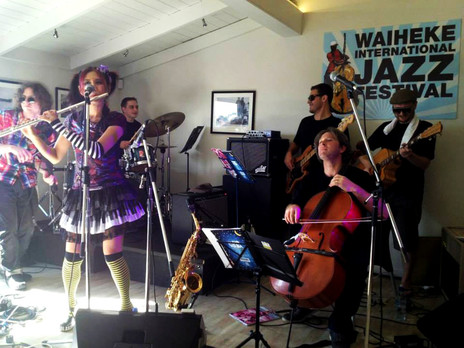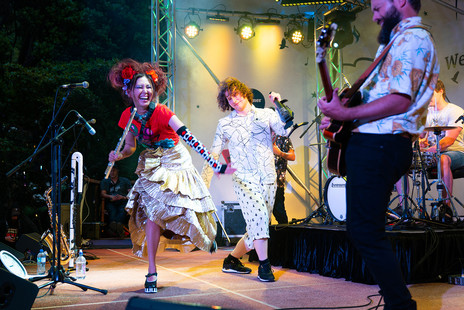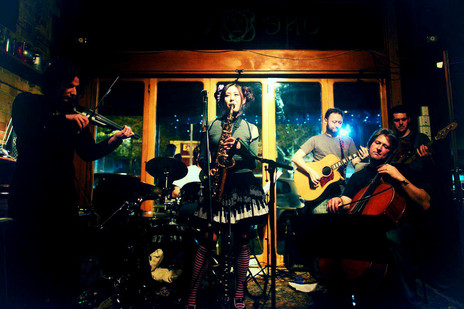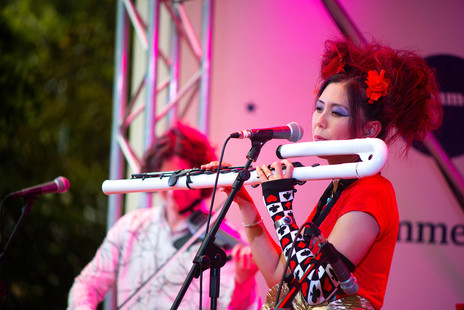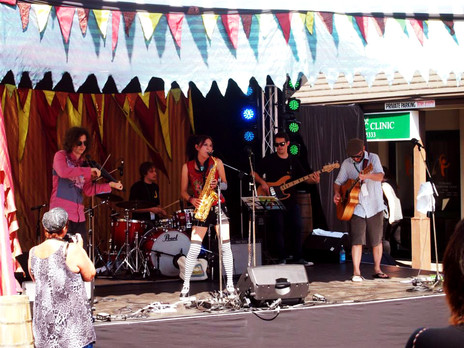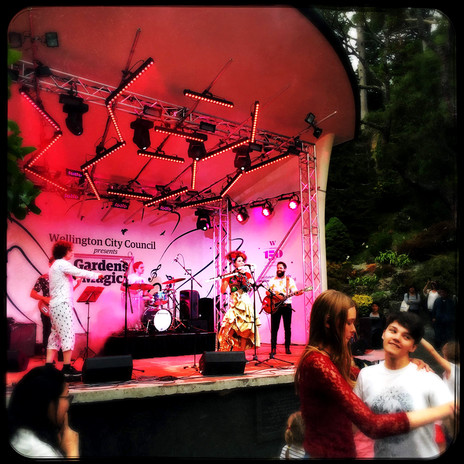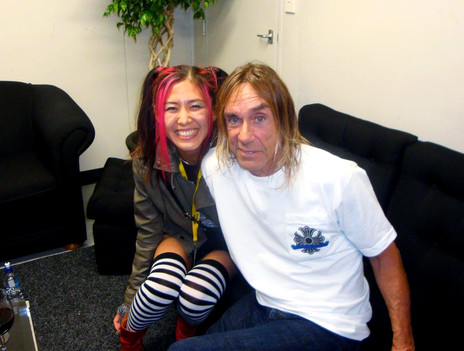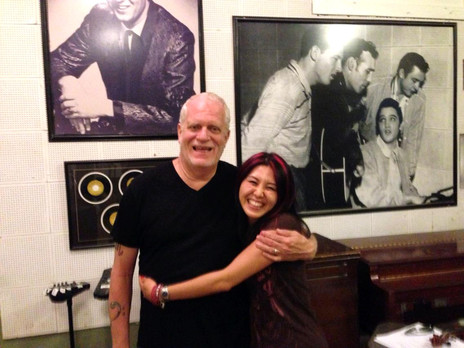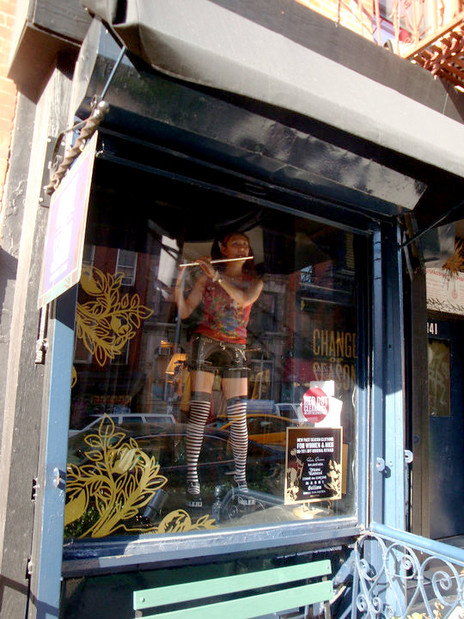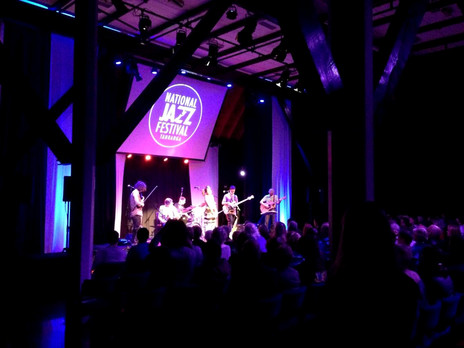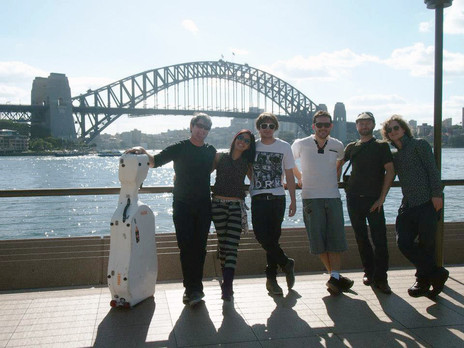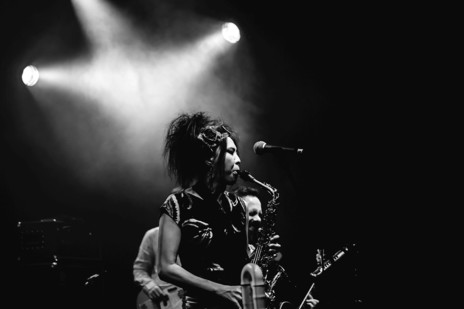When Wada was four, her parents enrolled her in piano lessons at a music school. Unfortunately, she didn’t enjoy it due to her teacher’s abusive behaviour. “Every time I made mistakes, I got hit, or told off really badly,” she confessed to me. “I thought I didn’t like music, but then I realised that I just didn’t like being taught that way!”
Wada’s father, whose company made software for civil engineering, was a huge fan of yachting. In 1996, when Wada was 16, New Zealand’s win of the America’s Cup inspired him to move the whole family across the sea to Burnside, Christchurch. Her parents were keen for her to continue piano lessons, so responded to an ad in the local newspaper. The teacher who knocked on her door turned out to be a flute professor at the University of Canterbury. “It was almost as if the flute chose me,” she told Stuff in 2014. “My father had an old flute and I had a spontaneous lesson. I loved it straight away. It’s hard now for me to imagine life without a flute.”
Wada threw herself into flute lessons with heartfelt passion and relentless drive
There was no turning back. Wada threw herself into flute lessons with heartfelt passion and relentless drive, practising for 10 hours a day. By the time she graduated high school, Wada was up to the challenge of studying flute at a tertiary level. She spent the next three years gaining a Bachelor of Music at the University of Canterbury. During this time, she met her husband and band member, violinist Pascal Roggen.
“I went to Gisborne to do a music competition,” she told me. “And I was billeted with my husband’s twin sister, and we were best friends in two seconds! And she said, ‘I have a brother! You should meet him!’ And then we were in love in two seconds!”
As Roggen was living in Auckland, they sustained a long-distance relationship until Wada graduated from university. Then, Wada briefly moved to Auckland before the pair relocated to London for further study. Wada had been accepted to a postgraduate diploma in classical flute at the prestigious Trinity College of Music.
Halfway through her study, Wada was offered a job as a flautist in the National Orchestra of Malta. At first thinking this was a dream come true, Wada discovered the reality wasn’t all she’d hoped for. “I thought that all I wanted to do with my life was to become an orchestral player,” she told Witchdoctor in 2010. “But as soon as I got the job it was, ‘oh, this is terrible’. My bottom was sore from sitting the whole time. I need to do something like jump around! And then music became a job, rather than something you do for fun.”
Now at a loose end, Wada returned to London to finish her diploma. During this time, she met violinist Nigel Kennedy, famous for injecting a punk ethos into classical music. Wada attended his performance at Ronnie Scott’s jazz club in a short skirt and knee-high boots. “He came to talk to me after the show,” she told Witchdoctor. “When I told him I played the flute, he said, ‘Oh, you have to come and jam’. I improvised with him and a guitarist and he was very complimentary. I told him I was still doing classical music and auditioning for orchestras and he said, ‘No no no – you’ve got that in you lady, get it out’.”
This was the right kind of encouragement. Wada began exploring jazz and world music, which led to a life altering discovery – Cuban music. “Their training is totally the old-school Soviet Union proper classical training from a really early age,” she told RNZ in 2014. “Then once they are really, really high level, they start doing all this Cuban music, really traditional style, and it was just mindblowingly great! And I just thought: ‘I wanna play the flute like them!’”
Wada travelled to Cuba in 2008 to learn from the greats
Enthused by this newfound discovery, Wada travelled to Cuba in 2008 to learn from the greats. She attended a jazz summer school in Havana and, later the same year, returned to live in Santiago de Cuba, where she went to jam sessions in cafés and bars with hopes of finding a teacher. She tells me she did eventually find one. “I just went up to a bar where they were performing, and I asked, ‘Could I have some lessons off you?’ And they said, ‘Okay. One CUC [Cuban convertible peso] a lesson!’ I said, ‘I can afford one CUC!’”
Her teacher was the accomplished flautist Rubén Leliebre. For the next few months, Wada’s playing grew and flourished under his guidance. She spoke animatedly to me about Leliebre’s intense passion for music. “He would say, ‘It doesn’t matter if you don’t have anything to eat, or if you don’t have electricity or water that day, as long as you have music!’ And I was like, ‘No, I definitely need food. I definitely need water!’ He would say, ‘You play with your blood! If you don’t have blood flowing in your body, you die! And music is like that, if we don’t play music, we’re gonna die!’”
Upon returning to London, Wada played with Cuban music groups there. After a Womad festival tour with Ska Cubano which ended in Taranaki, she decided to leave the band and stay in New Zealand. She moved to Auckland with hopes of finding Cuban musicians to play with, but that didn’t work out. “There were like eight Cubans living in Auckland, one of them sort of sings, two dancers, you can’t have a band with that!” she told Witchdoctor.
So she played with Latin groups for a while, but didn’t enjoy it. “They were using MIDI-tracks, and it was commercial Latin stuff that I didn’t really like. I wanted to do more traditional, proper Latin, not the wedding background music.”
In 2009, Wada featured in Orcon Broadband’s “Together Incredible” ad. With eight other New Zealanders she remotely performed backing for Iggy Pop singing his hit ‘The Passenger’. The ad, in which Wada plays both flute and piano, introduced the New Zealand public to her bubbly, energetic personality.
Wada began to think of forming her own group to combine her various influences which, along with jazz and Cuban music include punk, J-Pop and Japanese film scores – in particular, Joe Hisaishi’s music for the films of Hayao Miyazaki. Roggen introduced her to an old friend of his, composer and bassist Colin Hunter, who invited her to play in his band, the Colin Hunter Instrumental Quintet (CHIQ). Hunter composed most of the music they played, but wanted Wada to front the band. “He said, ‘We should put your face on it!’” she told me. “And we said, ‘Okay!’”
Wada discovered she had a propensity for punk lyrics
Meanwhile, Wada was beginning to write her own songs. Experimenting with singing in English, Japanese and Spanish, Wada discovered she had a propensity for punk lyrics, with titles such as ‘Piss Off (Such a Loser!)’. Acting on an impulse, she recorded seven of these songs at home to submit for consideration for SXSW 2010.
This project was released in 2009 as Wada’s debut EP, Travelling Bugs and Talking Shoes. Colourfully diverse, the EP sees Wada ricochet between anger, loss and desire. It sees her backed by the jazz quintet, by synths and drum machines on the raw and desperate ‘Lost’, by a huge organ on the seductive ‘Someone Extra’, sung from the perspective of a wife cheating on her husband with another woman. Wada becomes startlingly confessional on emotive piano ballad ‘Better Model’, and even lets loose a metal growl on ‘Kaze’. Through it all, Wada’s flute playing is ubiquitous, lending a unique sweetness and virtuosity to complement the sometimes gnarly subject matter. Travelling Bugs and Talking Shoes charted at No.9 on KiwiFM and, much to Wada’s amazement, got her into SXSW.
Wada and CHIQ prepared for the trip to Austin, Texas, but not before releasing another EP, The Traveller, this time of Hunter’s material, and an album, Postcards To Your Bed. It was Wada’s first full-length album. As well as Hunter’s instrumental compositions, it featured a few Wada originals, setting them against a spacious jazz landscape.
Despite being rewarding, SXSW proved a challenge. Two weeks before they were to leave, CHIQ’s drummer dropped a bombshell: he was leaving the band, and would not be coming. “We had to quickly find somebody,” she told me. “It turned out he was really lovely, but it was such a shock that we had been practising all along, and then he just left! So it was such a drama getting to SXSW. Because it was so stressful, everyone kind of lost the drive a little bit.”
Not long after returning home, CHIQ dissolved and the members went their separate ways. Wada was on her own once again, searching for bandmates. This time, they came in a more unexpected form. The Shit Fight, a punk hobby band from Wellington, were very keen on backing her. “They were friends playing together, jamming, but they didn’t have songs,” Wada told me. “I said: ‘I’ve got all these songs,’ and they said, ‘Oh, we’ll play them!’”
With Wada as the vibrant frontwoman, the Shit Fight became a live staple
With Wada as the vibrant frontwoman, the Shit Fight became a live staple, regularly selling out their energetic performances. Wada’s punk lyrics were finally given the backdrop they deserved: gritty distorted guitars and driving, aggressive drums. Still, she didn’t forsake her beloved flute, which danced playfully over the noise in her usual Cuban-inspired solos, lending their sound a sweetness not often heard in punk music.
The Shit Fight released a live album, In Bed During The Riot, in September 2010. Recorded in France, the album features new versions of several songs Wada had recorded previously with CHIQ, including ‘Call Girl’, ‘Someone Extra’, and ‘Piss Off (Such a Loser!)’.
The group set to work on a studio album, but it proved difficult. The members clashed, and the Shit Fight dissolved before the album was released. “Every one of the boys are really capable sound engineers as well as producers,” Wada told me. “So everyone was very strong minded!”
2011 was the year of the Christchurch earthquakes. As Wada’s parents still lived in Christchurch, she found herself quite affected by the news. Learning that her friends from the University of Canterbury were curating a compilation CD to fundraise for earthquake victims, she was excited but a little hesitant.
“All my friends from Canterbury, they’re classical musicians,” she told me. “They’re in orchestras and chamber music and stuff like that. At that time, I only was doing the Shit Fight gigs, and I was like, ‘My songs are not probably gonna fit!’ They said, ‘Of course you can write classical music! You used to do it at uni!’ I used to love composition at Canterbury, and I used to write a lot.”
So Wada set to work writing five instrumental songs for orchestra. When it came to finding other players, she realised that she didn’t know many classical musicians in Auckland. She did, however, have friends who were jazz musicians. “I didn’t have enough to make a proper orchestra, but I could have a jazzy orchestra!” Little did she know that this would be the start of Miho’s Jazz Orchestra, which would be Wada’s most successful and prolific band.
Miho’s Jazz Orchestra would be Wada’s most successful and prolific band
The first of MJO’s many incarnations consisted of 10 people whom Wada had gathered to record the earthquake relief songs. These included Pascal Roggen, who was now back from the UK; Leo Corso on bass, and Mark Dennison on clarinet and saxophone.
The compilation never went ahead. Let down after putting such effort into her contribution, Wada organised her own fundraiser: a gig at Auckland’s Café One2One with her newly formed jazz orchestra. “Only 10 people came, but it was really magical,” says Wada. “We were really really happy, and we thought, ‘oh my gosh, it’s so fun!’”
It was so fun that MJO kept playing together after a few more fundraising gigs for Christchurch. Wada released the initial recordings in October 2011 as an EP entitled Para Ti (For You). This was the world’s first introduction to MJO’s signature sound: upbeat and melodic flute-driven jazz with an undeniable pop sensibility.
Two months later, the anticipated Shit Fight studio album finally saw the light of day. Entitled Morning After, it contained studio versions of the entirety of ‘In Bed During the Riot’ and some new songs. This release was accompanied by several quirky and colourful music videos, most of which Wada directed herself. Particularly notable was ‘Mihozilla’, featuring a city made out of cardboard and inhabited by a group of kids, including a Wada lookalike; and ‘Someone Extra’, which stars gingerbread people. ‘Call Girl’, filmed in New York City by Lea Perella, is the only video not directed by Wada.
Meanwhile, Wada was also working on her first full-length record with MJO. The album, Wanderland, came out in June 2012. It was recorded and mixed in four days at Mt Eden’s The Lab Recording Studio and featured taiko drums in addition to the jazz orchestra. Wada told me the album was largely inspired by her new puppy.
“I was seeing the world through his eyes. Wanderland has all these puppy ideas. There’s a song called ‘The Dark Side Of Bouncy Castle’ and that’s about him being scared of going for walks on Fridays, because that’s the day our street has rubbish collection, so the rubbish bins are being tipped into the trucks. It’s about how, by looking behind the bins, he was trying to conquer his fear.”
Wanderland was accompanied by beautifully produced music videos directed by Rob Mayes. Particularly evocative is ‘Bears And Bamboos’, which sees Wada wandering the streets of Tokyo as if looking for something.
The video for ‘Bears And Bamboos’ features Wada wandering the streets of Tokyo
As was evident in the puppy-themed Wanderland, Wada was entering into a new phase with her writing. Each MJO album would be based around a particular concept or theme. Wada says this is a result of her new writing habits, formed because she loved writing so much it was negatively impacting other areas of her life. “I don’t want to do anything else when I’m writing. I just want my work to finish, and I want my child to go to bed, and I want everyone to not be around me so I can just write all the time! And I don’t want to be that person.” So she confined herself to only writing during periods without other commitments, resulting in most of her MJO albums being written in one week.
2013 saw the release of a vibrant and eclectic second album for MJO, which had shrunk to six members. The title, Exit 621, is a wordplay about avoiding the flavour enhancer E621, otherwise known as MSG. “During the tour our manager always had to shop in grocery stores for gluten free, MSG free, dairy free, and MSG was a quite tricky one,” Wada told Sub FM. “It’s a flavour enhancement called E621, and you had to always check to see like ‘Oh, E621, oh we can’t have this because it’s got MSG.’ We thought we gotta exit the whole MSG thing, so Exit 621 became the title!”
Not long after releasing Exit 621, MJO toured in Japan for the first time. This experience inspired their next album, Mystery Banana, released in 2014. “It felt like a new era,” says Wada. “Everything was new and mysterious!” The album title was inspired by Wada seeing a banana on top of the car in front of her while driving. “That’s a suspicious banana!” she laughs. “It’s not every day that you drive behind a banana car!” Mystery Banana debuted at No.13 on the NZ Album charts.
Following the release, Wada went to New Orleans to take part in the Trad Jazz Camp, an artistic residency for players of all levels. While in the States, she wanted to see Memphis and visit the legendary Sun Studio. Unaware that the studio still operated as well as being a museum, she called them before leaving New Zealand to ask if she could touch the instruments. “I said, ‘I know you are a museum, but I’d really like to touch stuff! I wanna touch the piano, and I wanna hear how it sounds, and I wanna hear the acoustics of the room! So can I sing a song or play the piano or something?’ And the lady said, ‘You could just book it!’ And I was like, ‘I could?’ And she said, ‘I’ll give you the name of the sound engineer, and here’s his number!’ Wada called the engineer, who was the Grammy award-winning producer Matt Ross-Spang. “He said, ‘You could block book it for a week and I’ll give you a discount.’ ‘I don’t need it for a week, I want it for ten minutes!’ He said, ‘Are you not gonna record anything?’ And I was like, ‘What? Can I record something?!’”
At the Sun Studios, wada Recorded the EP
‘Memphis Dreamin’
Wada booked the studio, then wrote four songs with the ambitious goal of having them recorded and mixed within four hours. Ross-Spang provided a backing band, including Dave Roe, who had played bass for Johnny Cash. In September 2014, Wada released the recordings as an EP titled Memphis Dreamin’. The city’s influence is notable, with the EP sounding more country than Wada’s other releases. Accompanying the release was a video for ‘Arigato’, Wada’s first song with vocals in three years. “That was about how music has taken me to all these places, and I’m so grateful that I have music in my life,” she smiles as she tells me the song’s meaning. “It’s because of music that I got to experience so many cool moments, and I got to do so much cool stuff.” The video features clips from Wada’s time at jazz camp.
In a very prolific year for Wada, the next month saw the release of MJO Live at the Lab, her answer to the fans’, and bassist Leo Corso’s, demands for a live album that captured the energy of their performance. A live audience was invited to MJO’s regular studio, The Lab, where the album was recorded in a single take. It features Wada explaining the stories behind the songs. “I always talk in my concerts,” she told me. “I always explain what the song’s about, so that the audience can relate more to it, cos it’s not like there’s words to the songs. If I didn’t explain, it’s just a bunch of instrumental songs … My bassist said, ‘The albums are great, but people aren’t going to get the whole experience because you’re not talking in between the songs!’”
Soon after, Wada was pregnant with her first son. She kept touring even in the late stages, though that came with its difficulties. “I had this massive bruise on my tummy from holding the saxophone,” she laughs as she remembers. This experience inspired a new album, Bumpy Road, released in 2015 and reaching No.11 on the NZ Albums chart. When her son was born, he provided further inspiration. “It was so magical,” Wada told me, sounding emotional. “I never expected to be able to love somebody so much. I knew I was gonna love this person, but there was another level of love! The first time I played flute after giving birth, I started writing these songs!” The songs became an EP, New World Sympathy, released in May 2016.
When her son was just over a year old, Wada had a close brush with death when an ectopic pregnancy burst. She was rushed to the hospital for surgery. Wada wrote her whole next album, Accidental Journey, while recovering. “It was about how grateful I am that I get to have a second chance at life,” she says, “that I didn’t die on that day and lose everything. Even now, I’m just really really happy that I get to be here.”
‘ACCIDENTAL JOURNEY’ FROM 2018 CONTAINS SOME OF HER MOST MOVING WORK
Released in 2018, Accidental Journey contains some of her most moving work, such as ‘Not Scared’, a playful romp written to encourage herself, and the meditative ‘Tui Song’, which takes its melody from a tūī Wada heard while walking her dog and baby. “[The bird] should get all the royalties,” Wada joked in a Thirteenth Floor interview. Accidental Journey reached No.8 in the NZ Albums chart, Wada’s most successful release to date.
It would be two years before the next MJO album. Oblong 20.5, which is still the group’s latest album, was released in 2020. Written while Roggen was in Russia performing at the St Petersburg Jazz Festival, the album explores environmental themes. Wada was inspired to write about this topic by her son’s concern for our world. “I guess in a way this is my first ever political album!” Wada writes in the album’s intro, highlighting how this project is the next stage in her evolution. “Through my music I have tried to tackle issues big and small; from the neighbours feeding cats, to ocean pollution, rainforest destruction and global warming.”
Since the release of Oblong 20.5, Wada continues to perform regularly with MJO and teach music at schools. Still bringing her infectious enthusiasm to every show, she will undoubtedly keep making music for many years to come.
